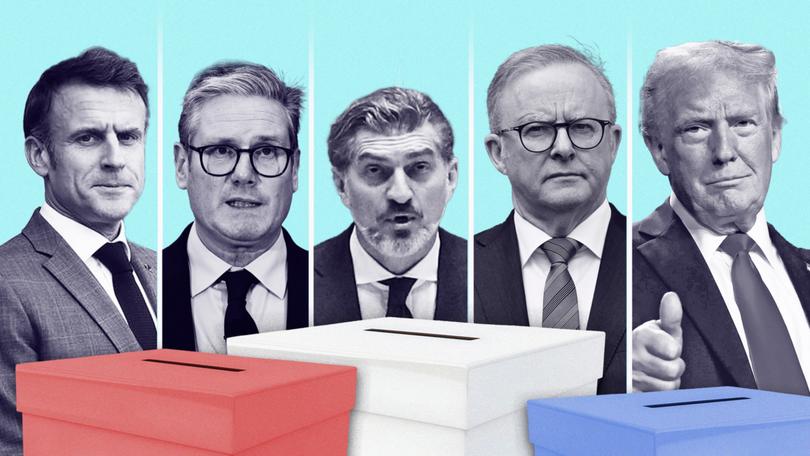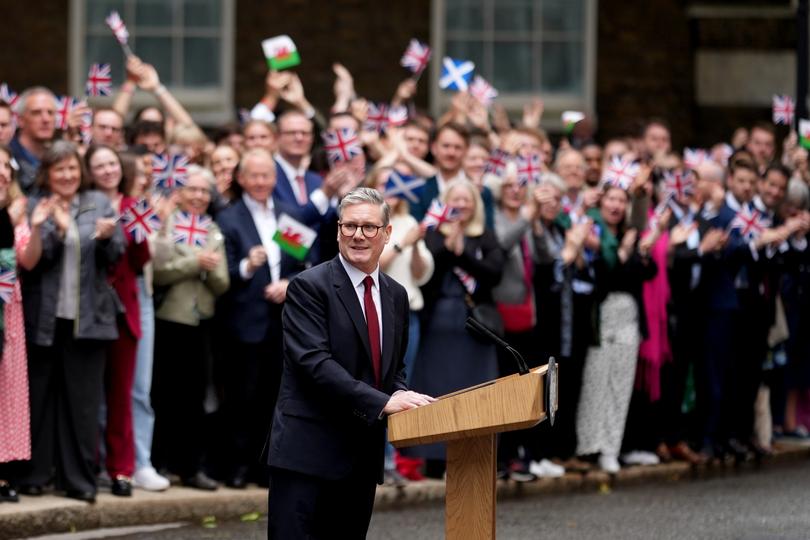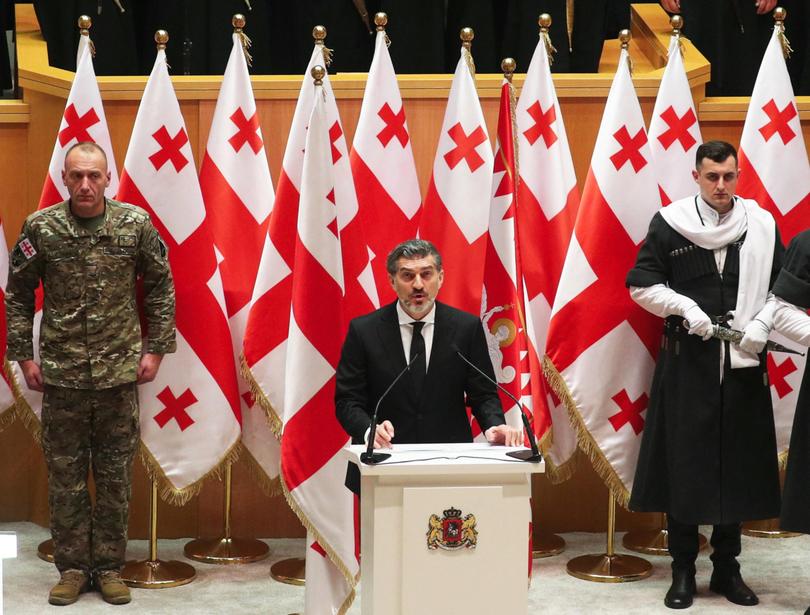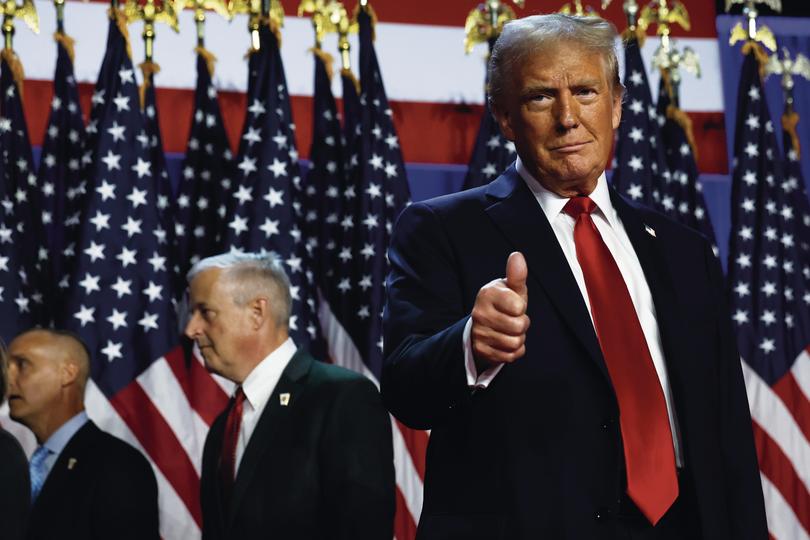Surging populism and rejecting incumbents: What we learned from the 2024 mega election year
More people voted in elections this year than ever before, putting democracy to the test across all four corners of the globe and producing some interesting trends that could spill into 2025.

More people voted in elections this year than ever before, putting democracy to the test across all four corners of the globe.
Through 73 national elections, and billions of cast ballots, voters across the world followed a similar trend of casting out or turning away from incumbents in a sign that democracy is still “putting up a fight” despite coming under threat.
Matt Qvortrup, a democracy expert at the Australian National University said the year had showed “democracy is still on the run, but it put up a bit of a fight this year”.
Sign up to The Nightly's newsletters.
Get the first look at the digital newspaper, curated daily stories and breaking headlines delivered to your inbox.
By continuing you agree to our Terms and Privacy Policy.“The levee hasn’t broken. Democracy has stopped and fought back and is in the fight back position . . . Democracies are messy,” he told The Nightly.
“Democracy is a place where Governments can lose elections. There’s no democracy if there’s no prospect of losing.”
Death for incumbents
According to the International Institute for Democracy and Electoral Assistance (International IDEA), about a third of this year’s elections resulted in party turnover.
About 15 per cent of the elections resulted in the losing party or candidate publicly rejecting the results.
But even where incumbents held on, they suffered significant blows.
The United Kingdom turfed out the Conservative Party for the first time in 14 years and the United States made a statement against the Democrats this year, in two of the biggest showings of rejecting incumbents.

South Africa’s Nelson Mandela’s African National Congress held onto to power but failed to win a majority of seats for the first time since the end of Apartheid.
Narendra Modi in India — whose status as a democracy is a point of contention — suffered a sizeable swing against him and now governs at the mercy of smaller parties.
Japan’s Shigeru Ishiba held on to prime ministership by the skin of his teeth; while French President Emmanuel Macron was dealt blow after blow as the country simultaneously shifted left and right resulting in months of instability.
In Taiwan, the Democratic Progressive Party’s presidential candidate Lai Ching-te — labelled a separatist by Beijing — was elected president, but the party lost its majority in parliament.
Professor Qvortrup said all those results showed the beauty of a democracy.
“The history of democracy is also a history of people being fed up, and saying that’s enough — we don’t believe what you’re doing,” he said.
“These are all good examples of democracy doing quite well.”
Even in less democratic countries like Bangladesh, there were green shoots.
Sheikh Hasina was re-elected in January in a “flawed process” but with a smaller margin after the opposition boycotted the election, but by September had been ousted in a wave of popular protest.
In Iran, after president Ebrahim Raisi was killed in a helicopter crash, reformist Masoud Pezeshkian was elected to succeed him — despite a system stacked against those aligned with the Council of Guardians.
While every election was shaped by local factors, Nicholas Whyte from global advisory firm APCO said the economic experience had played into many results.
“The economic recovery after the pandemic has been slow and unsatisfactory in many countries. That automatically weakens the value proposition for incumbents,” he said.
Ole von Uexkull, executive director of Right Livelihood, said there was more to democracy than just elections.
“Billions of people have been making use of their democratic rights this year to speak up for causes they believe in,” he told The Nightly.
“Elections are of course a very important way of democratic expression, but it is also micro-expressions that make up what Right Livelihood Laureate France Moore Lappé calls “living democracy” — in her words: ‘democracy is not what we have, democracy is what we do’.”
Rise of the right
Frustrations with the political class have provided opportunities for far-right populists to disrupt the traditional political status quo this year.
Pew Research, an American non-partisan fact tank, said populist parties had been “able to capitalise on voters’ frustrations with elites”.
Many figures campaigned on anti-immigration platforms, gaining ground in this year’s 720-seat European parliamentary elections.
Marine Le Pen’s right-wing populist National Rally picked up nearly a third of the French votes — about double that of Emmanuel Macron’s centrist Renaissance party.
Italian Premier Girogia Meloni more than doubled her party’s seats in the assembly, and the Alternative for Germany extreme-right party rallied enough seats to outpoll Chancellor Olaf Scholz’s Social Democrats.
The move to the right has been witnessed in national elections too.
Since the last EU election in 2019, populist or far-right parties have been voted to lead governments in Hungary, Slovakia and Italy, and are part of ruling coalitions in the likes of Sweden, Finland and the Netherlands.
The movement gained even more traction this year.
National Rally significantly increased the number of seats it holds in the French National Assembly.
In Austria, the far-right Freedom party won 29 per cent of the vote in September elections.
While it is unlikely to form part of any governing coalition, it was the highest share of any party and its best ever result.
Far-right parties also had strong showings in this month’s chaotic Romanian elections, while Portugal’s right-wing party Chega won 50 of the country’s 230 parliamentary seats during the March election.
Reform UK had the third-highest share of the vote in July’s UK general election, with 14 per cent.
Leader Nigel Firage finally won a seat in Parliament in his eighth attempt.
Alternative for Germany became the first far-right political party to win a state election in Germany since the Nazis in World War II.
In Georgia, far-right anti-EU and pro-Russia former footballer Mikheil Kavelashvili was inaugurated at the weekend after a controversial election process denounced as “illegitimate” by his predecessor.

Populists have had success outside Europe, as well. President-elect Donald Trump became the first republican in two decades to win both the popular vote and the electoral college – despite having been branded a “fascist” in the campaign.
His “Make America Great Again” movement has grown to become the dominant force within the Republican Party, making the GOP a more populist party than it was pre-2015.
Mr von Uexkull said a major learning from the global elections this year was that “truth and facts are the cornerstones of democracy”.
“The truth is under attack, both by authoritarian politicians for political gain and by social media platforms for economic gain,” he said.
“A dangerous alliance that could hardly see a better personification than in the bromance of the megalomaniac and the misogynist, (Elon) Musk and (Mr) Trump.”

Meanwhile in India, voters bucked the global authoritarian trend and gave Prime Minister Modi less support than in the last election.
Mr von Uexkull said the result “was really a positive surprise”.
“In the election campaign, (Modi’s party) were confident that they would get a two-thirds majority of parliamentary seats, which would have allowed them to change the constitution. That was a real threat to the secular framework of the country and it seemed within reach in the polls. But the Indian voters . . . gave Modi less support than in the last election,” he said.
Mr Whyte said Indian Prime Minister Modi’s failure to keep his parliamentary majority was “quite unexpected”.
“It showed that even in an established democratic society, the pundits can be wrong,” he said.
“This year we saw in South Africa, Bangladesh and India, over-reaching governments have had their wings clipped.
“Authoritarianism remains a convenient short-term tactic in a few cases, but not a long-term strategy.”
Systems in turmoil
France and South Korea have been fascinating studies in democracy this year.
The high vote among the French for le Pen’s RN in the EU election prompted President Macron to call a snap election in June to try and claw back a mandate, a move that blew back in his face and plunged the country into political crisis.
Voters shifted left and right, resulting in a parliament divided among three warring blocs without an absolute majority.
Prime Minister Gabriel Attal — who had taken over in January after Elisabeth Borne resigned — resigned in the wake of the results.
He stayed on with his ministers in a caretaker capacity for the 50 days France was left without an official prime minister, before Mr Macron named Michel Barnier prime minister in September.
But the deeply divided parliament brought the position into dispute, and his was short-lived before he was ousted in a historic no-confidence vote on December 4, after he pushed through a social security budget bill without a vote.
Francois Bayrou, a veteran centrist, subsequently became the country’s fourth prime minister this year — the sixth to serve under Mr Macron.

He has acknowledged the task of steering a government where there was no clear parliamentary majority would be difficult.
He will be vulnerable to a no-confidence vote of his own until at least July, when the next parliamentary election is due.
Mr Macron, meanwhile, has vowed to remain in office until his term ends in 2027.
Mr Whyte said the French experience showed the “constitution actually working”.
“Even in circumstances a bit different to what was imagined when the constitution was first designed. It’s quite right that a Prime Minister who does not have the confidence of his or her parliament leaves office,” he said.
Mr von Uexkull said he had been “shocked by the disregard of Macron for his own electorate”.
“It was his decision to call an election in June, and the leftist alliance emerged as the largest block. The logical conclusion would then be to ask the alliance to form a government and to tell his own party to find agreements with them in parliament,” he said.
“Making Barnier Prime Minister was a slap in the face of the French voters, and we saw the result (earlier this month).
“That kind of arrogance will only fuel populism.”
South Korea was another fascinating display of democracy this year.
President Yoon Suk Yeol’s People Power Party lost its National Assembly majority in the April election in what was a strong message from voters.
Despite that, President Yoon imposed martial law late at night earlier this month after accusing the ruling Democratic Party of “anti-state activities”.
It attracted a late-night revolt, with martial law overturned after six hours and his eventual impeachment.
Professor Qvortrup said in that course of events, South Korea had “shown the spirit of democracy in a way no other country has”.
But the system was thrown into further turmoil last week, when acting president Prime Minister Han Duck-soo was impeached in an unprecedented move.
Analysts say the system will continue to be one to watch.
Australia’s turn next
Prime Minister Anthony Albanese has until May 17, 2025, to send Australian voters to the polls.
His Labor Government has taken a dive in the opinion polls, in line with the global trend of turning against incumbents.
Political analysts forecast that even if Mr Albanese remains Prime Minister after the poll, he will most likely have to lead a minority Government.

